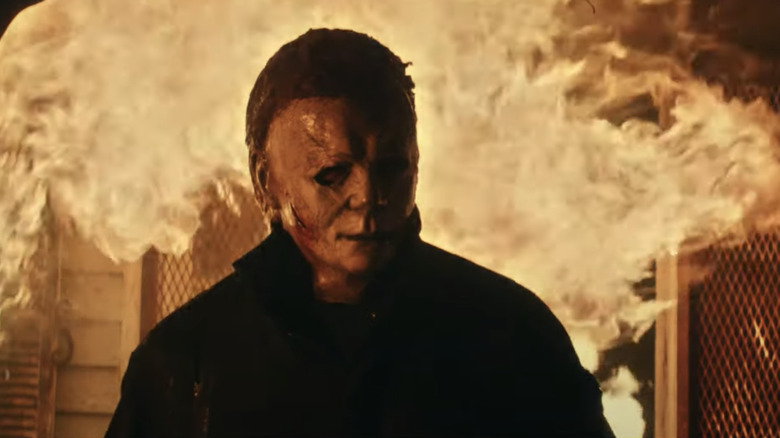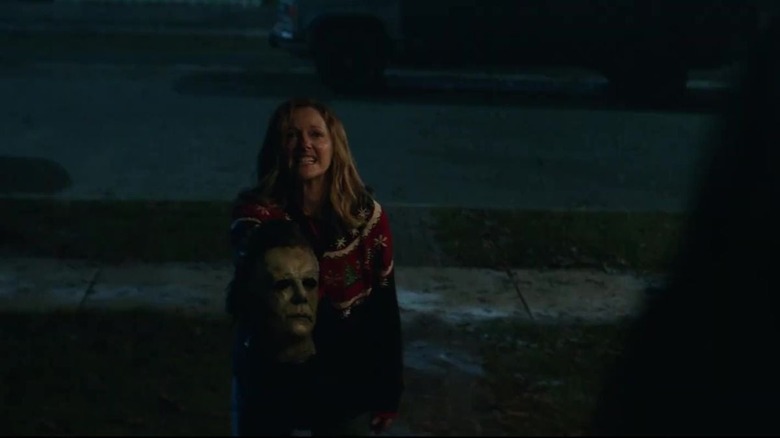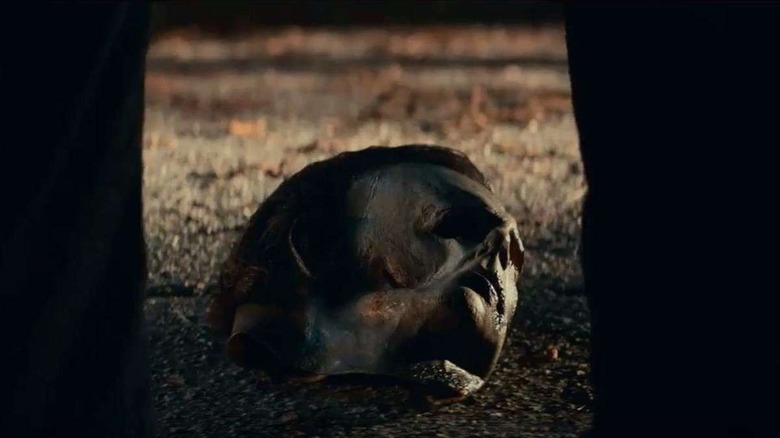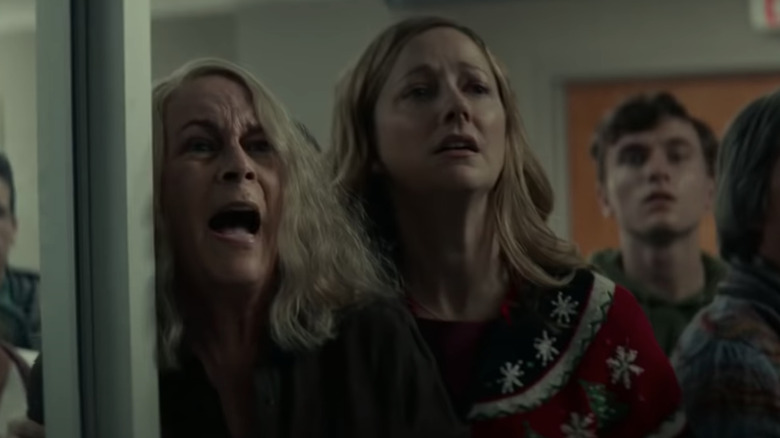Halloween Kills Review: A Compelling Sequel That Proves There's More To Mine From Michael Myers [Venice 2021]
"Halloween" sequels tend to follow a predictable pattern — after installments that foreground Jamie Lee Curtis' Laurie Strode, they tend to falter by removing her from the narrative. For a while in "Halloween Kills," David Gordon Green's follow-up to the 2018 legacyquel, it feels as if he's about to repeat history a third time with the character cooped up in a hospital bed for most of the first hour. But by the time she rises and resumes her never-ending fight against her grisly foe Michael Myers, the film has successfully shifted its focus toward a new center of gravity: the larger community of Haddonfield.
The film that results is something that feels entirely at home within the series' history and something that tries to journey down avenues unexplored in the previous 11 films. "Halloween Kills" is a direct sequel to the 2018 "Halloween;" it quite literally continues the action from the mayhem of that evening when three generations of Strode/Nelson women believe they have finally vanquished their masked menace.
But as far as franchise installments go, Green and co-writers Danny McBride & Scott Teems show far less interest in checking off familiar signifiers for fan service. After proving they could relaunch "Halloween," they depart a bit from the formula to exciting and energizing effect. It's a worthy series entry that manages that tricky balance of providing enough of what long-time fans expect while also bringing a unique reflection and perspective to the well-known property.
Haddonfield in the Spotlight
Much of the "Halloween" franchise — at least the installments that are frequently considered the best of the bunch — mine the experiences of Laurie Strode for suspense and character identification. And rightfully so, given that she's the very embodiment of the "final girl" archetype in horror films chosen to represent the virtues and viewpoint of the audience. But there are only so many novel ways to convey her experience, and "Halloween Kills" feels a bit like a nodding acknowledgment that the series cannot just turn to Jamie Lee Curtis and her iconography as a "get out of jail free" card. She's not a renewable resource.
Laurie might be the most prominent target of Michael Myers, but she's far from the only one. The entirety of Haddonfield, Illinois — a fictional idyllic Middle American small town — has borne witness to his intermittent bursts of terror. "Halloween Kills" acknowledges that such a legacy imprints itself on the psyche of a people. Some of the film's most impressive moments come from seeing just how widely Michael charts the life course of characters beyond just the series' leading lady. Even if he just represents an urban legend to some Haddonfield residents, they have internalized the indiscriminate evil to a startling extent.
This isn't just Laurie's fight, "Halloween Kills" suggests. All of society must do their part to stamp out the villainy in their midst. When it becomes clear that their terrorizer has resurfaced, Haddonfield residents led by Anthony Michael Hall's Tommy Doyle quickly mobilize to put an end to his reign of fear once and for all. The film showcases both the strengths and shortcomings of communities forged in trauma. Collective action gives them strength in numbers against their adversary, especially given the way Michael preys on the solitary and defenseless. Though with tensions running high, that solidarity can quickly sublimate to vigilantism and mob justice.
Michael's Evil Gets Grislier
It's easy to see why panic sets in so quickly among the town — this particular iteration of Michael Myers is notably more gruesome. The "Halloween" franchise, like any long-running horror series, tends to refract societal notions of evil through the funhouse mirror of genre. Michael is an illogical but existential threat, tough to vanquish because he's so nebulously defined. It's a slippery concept because filmmakers can bend his nature at their will. But when a character can be everything, it becomes quite a thrill to see what they choose.
In "Halloween Kills," David Gordon Green seems to hold longer on the brutal murders of ordinary citizens than in previous installments. Where artful cutaways let the viewer's brain fill in the gaps of his killings, Green leaves little to the imagination here. Michael stabs his victims multiple more times than necessary. He jams his fingers into eye sockets and holds them there. The violence feels cruel, targeted, and quite methodical. He's beyond inescapable here. He's truly inhumane.
After four years in America summed up astutely by journalist Adam Serwer's book title – "The Cruelty Is the Point" – this manifestation of Michael Myers feels quite fitting for the time of its release. "Halloween Kills" does not gleefully delight in the sight of blood and gore. The cleverness of the kills is always the first entry point into the film, but the way Green lingers on the absolute barbarism of Michael Myers undercuts the audience deriving any kind of cheap thrill at the expense of human life. The threats facing the world from any number of sources feel relentless, and so should the release valve of genre filmmaking.
Onward to Halloween Ends
There are some indications that Green and his co-writers view Michael as a literalization of evil's vicious circle. By some characters' postulation, he's driven even further into his depravity by the unempathetic treatment he receives by supposedly good people. It's an intriguing evolution of the character's psychology, albeit one somewhat flimsily substantiated here. Perhaps with more runway, this trilogy can complete the thought.
Where "Halloween Kills" stumbles is when it gets heavy-handed in setting up the forthcoming sequel "Halloween Ends." After a strong first two acts, Green slips back into some pratfalls of cinematic universes — namely, using the valuable real estate of one film to establish the next. The third act is prone to heavy-handed monologuing and callbacks in a way that most of the film manages to avoid.
While it's a bit frustrating to see an exciting departure dip back into conventional form, there's at least some comfort in knowing that Green has ambitions to mine rich thematic territory. As Laurie telegraphs toward the film's close, the struggle is no longer in determining who is at fault for Michael's actions. It's in taking responsibility for keeping his savagery in check — as well as the intergenerational damage his murder sprees cause to Laurie's daughter Karen (Judy Greer) and granddaughter Allyson (Andi Matichak).
There's good reason to be excited for how Green will bring this all to a head in his grand finale. "Halloween Kills" manages to put a playful but petrifying spin on mythology without resorting to cheap self-referentiality. He sees the series as material to interrogate, not merely venerate. If this film is any indication, there's still plenty of untouched areas for examination.
/Film Rating: 7.5 out of 10



